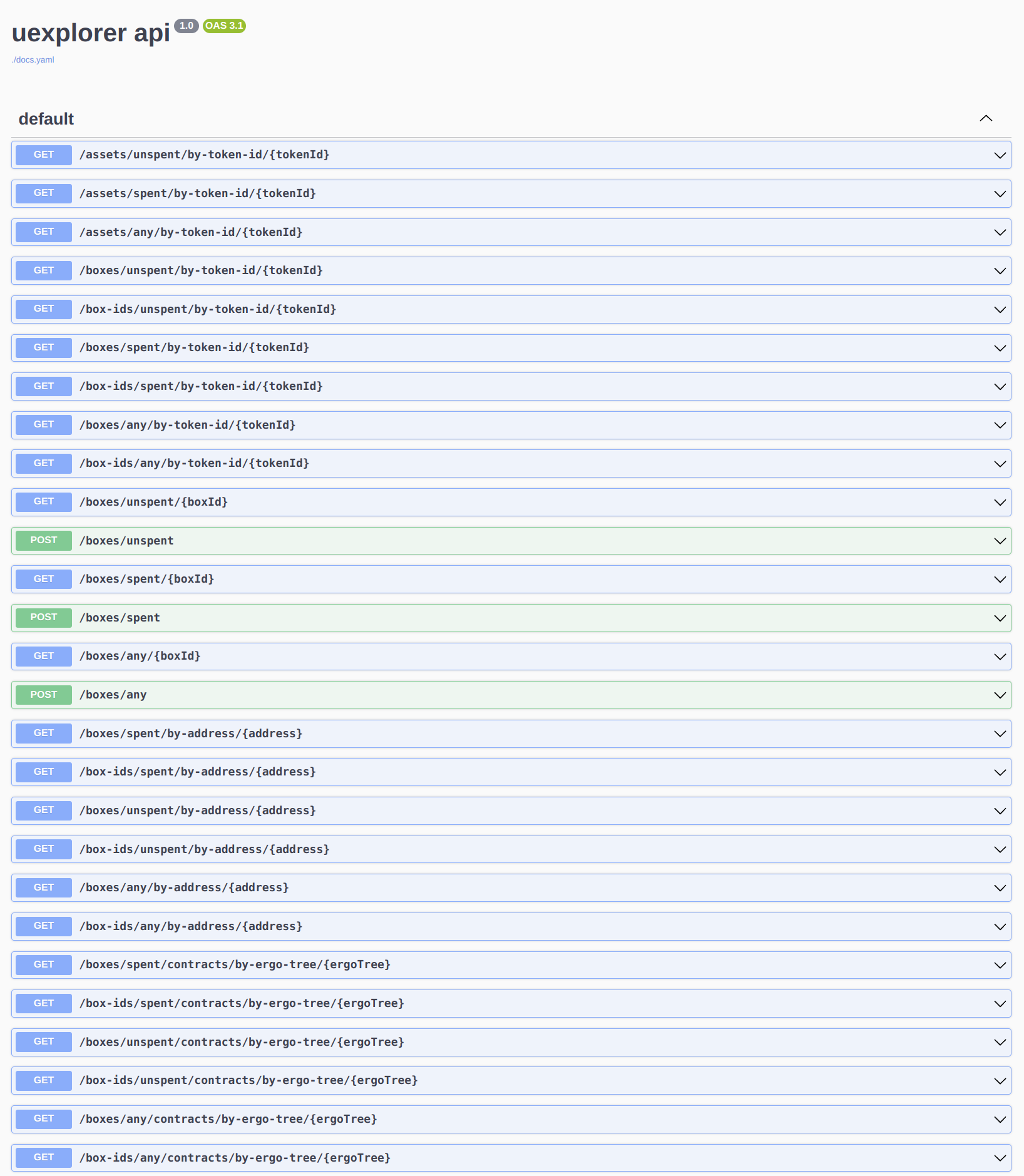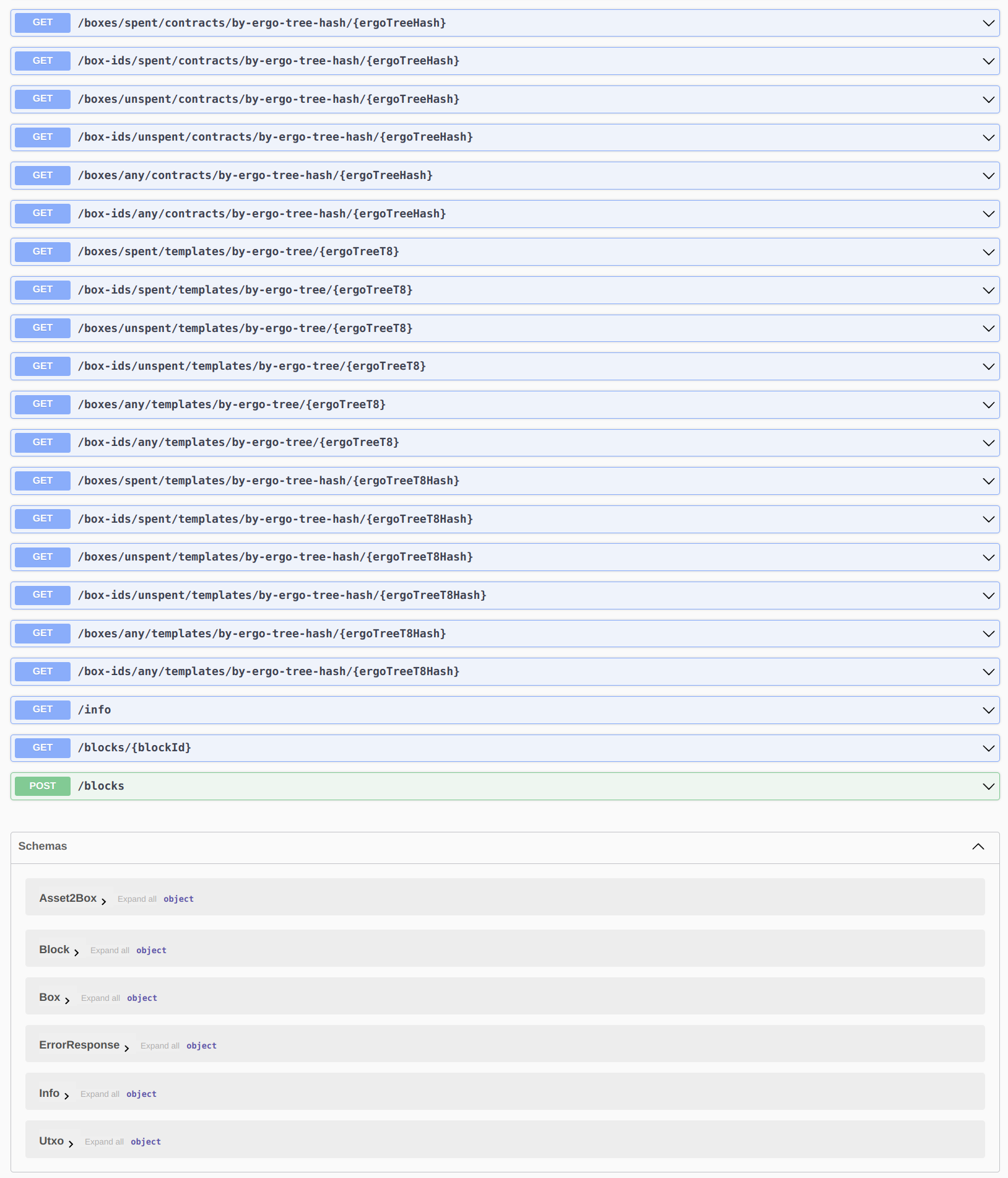WIP - heavily developed (built on ZIO 2)
Blockchain weak spot? Having R/W efficient, cryptographically provable state
- Reason? Peer-to-peer architecture / consensus
- state in virtual merkle-tree structure backed by key-value store (RocksDB/LevelDB) without analytical possibilities
- requires Explorer that indexes data into queryable representation
Explorer weak spot? Indexing state efficiently and perform fast analytical queries
- Reason? Data distribution Supernode problem
- queries for hot addresses and assets overload DBs => requires Explorer that indexes data in supernode-resistant manner
- finding out if assets have been spent or not in query time puts huge pressure on DB
- let's do that at indexing time so that queries are real-time
Supplementary, lightweight (μ = micro) Ergo explorer/analyzer with multiple modes of operation :
embedded: running as single jvm process, only some blockchain data in embedded MvStore- blocks are stored to
MvStoreusing only a single thread to avoid DB corruption, it takes ~ 3-4 hours
- blocks are stored to
cassandra: additional cassandra backend with all blockchain data (very fast, it does not slow indexing down)- blocks are persisted concurrently so indexing is very fast
janusgraph: all transactions are fed into a graph for analysis (takes all day to index!)- not tested and used, TBD
Properties :
- rapid indexing speed (30mins on
16vCPU/20GB RAMserver to 90mins on4vCPU+/16GB RAM - datastructures accessible in real-time
- whole utxo state persisted in MvStore
- hot address statistics (box and tx counts, last tx height, etc.)
- janus graph of the whole chain (good to use in combination with hot address statistics to avoid infinite traversals)
- plugin framework, add a plugin that is supplied with
- all new mempool transactions and blocks
- all handy datastructures and janus graph needed for analyzing such transaction/block
- stargate graphql server over cassandra schema
- allows for arbitrary analyzes and queries on top of all available data
- resilient
- it primarily uses local node (good for initial sync) with a fallback to peer network
Chain indexer syncs with Node and keeps polling blocks while discarding superseded forks. Valid "Source of Truth" transaction data downloaded from Nodes is persisted into cassandra within an hour. Secondary Data Views that are derived from Source of Truth can be easily reindexed very fast which allows for flexible development. Major Data Views derived from Source of Truth :
Requirements:
SBT 1.7.xfor building andOpenJDK 11.xfor running bothchain-indexerandergo-node16GB+of RAM and4vCPU+for fast sync from local Ergo Nodestart-indexing.shscript asks you if you are syncing chain from scratch or not- ergo-node = 2GB
- cassandraDB = 6GB
- chain-indexer = 6GB
8GB+of RAM and4vCPU+for fast sync from local Ergo Node with embedded storage only- ergo-node = 2GB
- chain-indexer = 6GB
3GB+of RAM and1vCPU+for synced db, that can run from peer-network- cassandraDB = 1GB
- stargate = 1GB
- chain-indexer = 1GB
- 100GB free disk space for data in cassandra and 3GB for JanusGraph, MvStore ~ 10GB but it will increase
- local fully synced Ergo Node is running if you are syncing from scratch
- polling new blocks automatically falls back to peer-network if local node is not available
A Jar with Plugin implementation can be put on classpath and it will be passed each new Tx from mempool or each new Block
together with all instances necessary for analysis:
def processMempoolTx(
newTx: Transaction, // new Tx is passed to all plugins whenever it appears in mempool of connected Nodes
utxoState: UtxoState, // Utxo State
graph: Option[GraphTraversalSource] // Janus Graph for executing arbitrary gremlin traversal queries
): Future[Unit]
def processNewBlock(
newBlock: Block, // new Block is passed to all plugins whenever it is applied to chain of connected Nodes
utxoState: UtxoState, // Utxo State
graph: Option[GraphTraversalSource] // Janus Graph for executing arbitrary gremlin traversal queries
): Future[Unit]
See example modules/alert-plugin implementation which submits high-volume Txs and Blocks to Discord channel with detailed information.
It was able to render entire graph of related transactions/addresses via passing Graphml to Retina,
and providing hyper-link to Retina's UI interface but that was not resilient due to unpredictable graph size (seeking for alternative).
When ./start-all.sh script finishes, go to http://localhost:8085/playground and
copy/paste the auth token from following snippet to HTTP HEADERS at bottom-left of the playground
and follow documentation.
curl -L -X POST 'http://localhost:8081/v1/auth' \
-H 'Content-Type: application/json' \
--data-raw '{
"username": "cassandra",
"password": "cassandra"
}'
and copy {"authToken": "secret"} paste {"x-cassandra-token": "secret"}
There is an address bar in the playground UI where you select either DDL (/graphql-schema) or DML (/graphql/<keyspace>) :
DDL (/graphql-schema)
query {
keyspace(name: "uexplorer") {
node_outputs: table(name: "node_outputs") { columns { name } }
}
}
At https://localhost:8090/explorer/swagger
DML (/graphql/uexplorer)
query {
node_outputs(filter: {header_id: {eq: "b0244dfc267baca974a4caee06120321562784303a8a688976ae56170e4d175b"}}){
values {
address
}
}
}
query {
node_outputs(filter: {address: {eq: "88dhgzEuTXaVTz3coGyrAbJ7DNqH37vUMzpSe2vZaCEeBzA6K2nKTZ2JQJhEFgoWmrCQEQLyZNDYMby5"}}){
values {
box_id
}
}
}
Not necessary as all docker images from docker-compose are publicly available :
$ docker build . -t pragmaxim/uexplorer-chain-indexer:latest
# tree
├── schema-tables.cql # db schema applied at start-indexing.sh phase
├── schema-indexes.cql # db indexes applied at start-querying.sh phase
├── ergo.conf # expects global env variable SCOREX_REST_API_KEY_HASH
├── chain-indexer.conf # no need to change anything
├── docker-compose.cassandra.yml # base docker-compose, nothing runs without cassandra
├── docker-compose.indexer.yml # base for minimal indexing with locally running Ergo Node
├── docker-compose.node.yml # apply to base for running also Ergo Node
├── docker-compose.stargate.yml # apply to base for graphql querying
├── docker-compose.janusgraph.yml # apply to base for using apps like gremlin console or IDEs that interact with Janusgraph
├── start-indexing.sh # starts indexing, feel free to start up services individually
├── start-querying.sh # applies indexes and starts stargate for graphql querying
├── stop-all.sh # safely stops everything running
└── drain-cassandra.sh # cassandra must be stopped gracefully
$ cd docker
$ start-indexing.sh
$ docker compose logs uexplorer-chain-indexer
11:43:19 Initiating indexing of 816 epochs ...
11:43:21 New epoch 0 detected, utxo count: 1025, non-empty-address count: 122, persisted Epochs: 1[0], blocks cache size (heights): 33[1 - 1538]
11:43:22 New epoch 1 detected, utxo count: 2049, non-empty-address count: 134, persisted Epochs: 2[0 - 1], blocks cache size (heights): 33[1025 - 2562]
11:43:23 New epoch 2 detected, utxo count: 3073, non-empty-address count: 235, persisted Epochs: 3[0 - 2], blocks cache size (heights): 33[2049 - 3586]
...
12:37:11 New epoch 815 detected, utxo count: 1878724, non-empty-address count: 158786, persisted Epochs: 816[0 - 815], blocks cache size (heights): 32[835585 - 835616]
12:37:45 New epoch 816 detected, utxo count: 1886283, non-empty-address count: 159562, persisted Epochs: 817[0 - 816], blocks cache size (heights): 32[836609 - 836640]
$ start-querying.sh
If Ergo Node is not running on localhost, it will use peers in the network
$ sbt stage
$ cd modules/chain-indexer/target/universal/stage/
$ ./bin/chain-indexer
Troubleshooting:
-
cassandraDB crashes :
- reason : most likely OOM killer kicked in and killed cassandra process
- solution : avoid running another memory intensive processes (Browser, IDE),
chain-indexer is tested on a dedicated server (laptop is unstable environment)
$ docker logs cassandra 2>&1 | grep -i kill 2022-09-10 09:08:51,142 INFO exited: cassandra (terminated by SIGKILL; not expected) - docker version of cassandra is not prod-ready, ie. OOM killer prone, etc.
-
Chain-indexer crashes :
- reason: almost exclusively due to cassandra connection problems if OOM killer kills it
- solution :
- nothing should happen during polling when chain-indexer recovers on its own
- if cassandra is killed during heavy initial sync by OOM killer, there might be data loss as it is eventually consistent database which requires proper shutdown. Please start syncing from scratch with empty DB.
- if indexing crashes but cassandra logs do not contain
SIGKILL, no data gets lost
Cleanup:
$ ./stop-all.sh
$ docker volume ls # cassandra and ergo volumes contain a lot of data
- Rest API that would provider access to all the interesting data
- UI that would render all the interesting data
- using approximate datastructures like datasketches or algebird
- using overflowdb instead of JanusGraph for performance reasons

